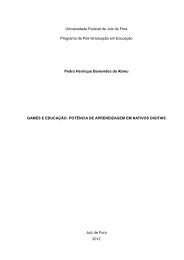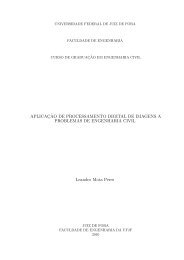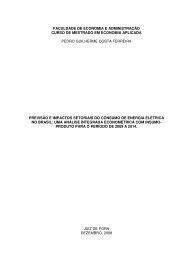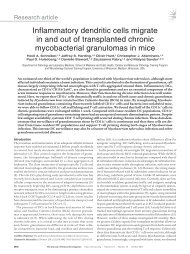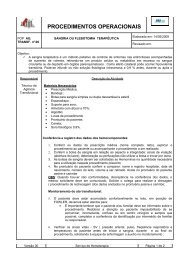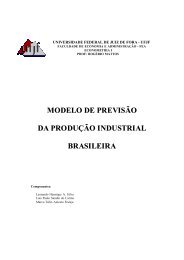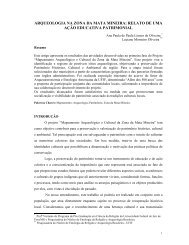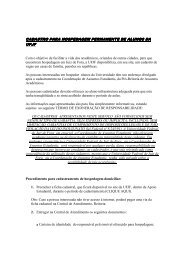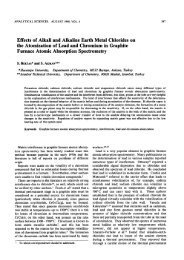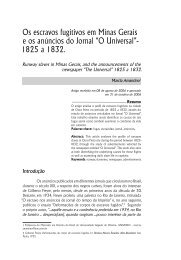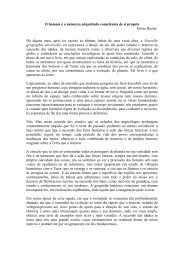Volume 6 | Número 2 Julho - Dezembro de 2012 - Universidade ...
Volume 6 | Número 2 Julho - Dezembro de 2012 - Universidade ...
Volume 6 | Número 2 Julho - Dezembro de 2012 - Universidade ...
You also want an ePaper? Increase the reach of your titles
YUMPU automatically turns print PDFs into web optimized ePapers that Google loves.
Psicologia em Pesquisa | UFJF | 6(02) | 139-150 | <strong>Julho</strong>-<strong>Dezembro</strong> <strong>de</strong> <strong>2012</strong><br />
Além disso, diversas questões adicionais<br />
permanecem sem resposta. Por exemplo, as diferenças<br />
individuais quanto aos fatores cognitivos cruciais<br />
à aprendizagem da aritmética, a especificida<strong>de</strong><br />
dos preditores em relação aos múltiplos <strong>de</strong>sfechos<br />
representados pela complexida<strong>de</strong> e natureza<br />
hierárquica das habilida<strong>de</strong>s aritméticas e, finalmente,<br />
ao efeito <strong>de</strong> diversos fatores cognitivos, os quais<br />
têm <strong>de</strong>staques diferenciais conforme a fase do<br />
<strong>de</strong>senvolvimento da criança. A memória <strong>de</strong> trabalho<br />
visoespacial po<strong>de</strong> ser mais importante no início da<br />
aprendizagem da aritmética, crescendo a importância<br />
dos fatores fonológicos à medida que a criança avança<br />
no currículo. Da mesma forma, o senso numérico<br />
po<strong>de</strong> ser mais importante no início da aprendizagem.<br />
Po<strong>de</strong> ocorrer, também, que as crianças com DAM<br />
não apresentem um déficit absoluto, mas, sim, uma<br />
maturação mais lenta das habilida<strong>de</strong>s relacionadas ao<br />
senso numérico.<br />
Assim, apesar da falta <strong>de</strong> estudos mais<br />
robustos, principalmente, sobre o <strong>de</strong>senvolvimento<br />
específico dos endofenótipos <strong>de</strong> dificulda<strong>de</strong><br />
<strong>de</strong> aprendizagem, o fato <strong>de</strong> se conhecer os<br />
mecanismos subjacentes à aprendizagem da<br />
matemática e os critérios <strong>de</strong> diagnóstico das DAM<br />
po<strong>de</strong> auxiliar na melhor caracterização clínica para<br />
essa população. Por consequência, a formulação<br />
<strong>de</strong> intervenções mais específicas para indivíduos<br />
com aprendizagem <strong>de</strong>ficitária da aritmética po<strong>de</strong><br />
auxiliar no <strong>de</strong>senvolvimento do capital mental <strong>de</strong><br />
uma comunida<strong>de</strong>.<br />
Referências<br />
Antshel, K. M., Faraone, S. V., Maglione, K., Doyle,<br />
A., Fried, R., Seidman, L., & Bie<strong>de</strong>rman, J.<br />
(2009). Is adult attention <strong>de</strong>ficit hyperactivity<br />
disor<strong>de</strong>r a valid diagnosis in the presence of high<br />
IQ? Psychological Medicine, 39(8), 1325-1335.<br />
Archer, T., Oscar-Berman, M., & Blum, K. (2011).<br />
Epigenetics in <strong>de</strong>velopmental disor<strong>de</strong>r: adhd and<br />
endophenotypes. Journal of Genetic Syndrome &<br />
Gene Therapy, 2(104), 1000104.<br />
Auerbach, J. G., Gross-Tsur, V., Manor, O., &<br />
Shalev, R. S. (2008). Emotional and behavioral<br />
characteristics over a six-year period in youths with<br />
persistent and nonpersistent dyscalculia. Journal of<br />
Learning Disabilities, 41(3), 263-273.<br />
Bachot, J., Gevers, W., Fias, W., & Roeyers, H.<br />
(2005). Number sense in children with visuospatial<br />
disabilities:orientation of the mental number line.<br />
Psychology Science, 47, 172-183.<br />
Bad<strong>de</strong>ley, A. (2001). The magic number and the<br />
episodic buffer. Behavioral and Brain Sciences,<br />
24(1), 117-118.<br />
Barnes, M. A., Wilkinson, M., Khemani, E.,<br />
Bou<strong>de</strong>squie, A., Dennis, M. & Fletcher, J. M.<br />
(2006). Arithmetic processing in children with<br />
spina bifida: Calculation accuracy, strategy use,<br />
and fact retrieval fluency. Journal of Learning<br />
Disabilities, 39(2), 174-187.<br />
Berg, D. H. (2008). Working memory and arithmetic<br />
calculation: the contributory role of processing<br />
speed, short-term meory and reading. Journal of<br />
Experimental Child Psychology, 99(4), 288-308.<br />
Berg, D. H., & Hutchinson, N. L. (2010).<br />
Cognitive processes that account for addition<br />
fluency differences between typically achieving<br />
in arithmetic and children at-risk for failure in<br />
arithmetic. Learning Disabilities: A Contemporary<br />
journal, 8, 1-20.<br />
Bishop, D. V. M., & Rutter, M. (2009).<br />
Neuro<strong>de</strong>velopmental disor<strong>de</strong>rs: conceptual issues.<br />
In M. Rutter, D. V. M. Bishop, D. S. Pine, S.<br />
Scott, J. Stevenson, E. Taylor & A. Thapar (Orgs.),<br />
Rutter’s child and adolescent psychiatry, (5ª ed., pp.<br />
32-41). Oxford: Blacwell.<br />
Bruan<strong>de</strong>t, M., Molko, N., Cohen, L., & Dehaene, S.<br />
(2004). A cognitive characterization of dyscalculia in<br />
Turner syndrome. Neuropsychologia, 42(3), 288-298.<br />
Bull, R., & Scerif, G. (2001). Executive functioning<br />
as a predictor of children’s mathematics ability:<br />
inhibition, switching, and working memory.<br />
Developmental Neuropsychology, 19(3), 273-293.<br />
Butterworth, B. (2005). The <strong>de</strong>velopment of<br />
arithmetical abilities. The Journal of Child<br />
Psychology and Psychiatry and Allied Disciplines,<br />
46(1), 3-18.<br />
Bynner, J., & Parsons, S. (2006). Does Numeracy<br />
Matter More? Education. National Research and<br />
Development Centre for Adult Literacy and<br />
Numeracy, Institute of Education, University<br />
of London.<br />
Camos, V. (2008). Low working memory capacity<br />
impe<strong>de</strong>s both efficiency and learning of number<br />
transcoding in children. Journal of Experimental<br />
Child Psychology, 99(1), 37-57.<br />
Cooper, C. L., Field, J., Goswami, U., Jenkins, R.,<br />
& Sahakian, B. J. (2010). Mental capital and<br />
wellbeing. Oxford: Wiley-Blackwell.<br />
Haase, V. G., Costa, A. J., Antunes, A. M. & Alves, I. S. 147



